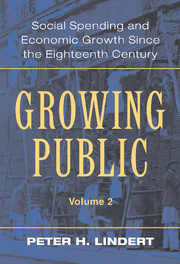Book contents
- Frontmatter
- Contents
- Preface to Volume 2
- PART FIVE THE UNDERLYING FRAMEWORK
- PART SIX ACCOUNTING FOR SOCIAL SPENDING, JOBS, AND GROWTH
- APPENDICES
- A Time Series on School Enrollments and Teachers, 1830–1930
- B Conflicting Data on Elementary School Enrollments within the United Kingdom, 1851–1931
- C Public and Total Educational Expenditures as Percentages of National Product, since 1850
- D Regressions Predicting Schooling, Growth, Social Transfers, and Direct Taxes, 1880–1930
- E Regressions Predicting Social Spending, Growth, and Employment, OECD 1962–1995
- F Social Transfers circa 1990 versus History
- G Postregression Accounting Formulae
- Notes
- Bibliography
- Index
G - Postregression Accounting Formulae
Published online by Cambridge University Press: 12 January 2010
- Frontmatter
- Contents
- Preface to Volume 2
- PART FIVE THE UNDERLYING FRAMEWORK
- PART SIX ACCOUNTING FOR SOCIAL SPENDING, JOBS, AND GROWTH
- APPENDICES
- A Time Series on School Enrollments and Teachers, 1830–1930
- B Conflicting Data on Elementary School Enrollments within the United Kingdom, 1851–1931
- C Public and Total Educational Expenditures as Percentages of National Product, since 1850
- D Regressions Predicting Schooling, Growth, Social Transfers, and Direct Taxes, 1880–1930
- E Regressions Predicting Social Spending, Growth, and Employment, OECD 1962–1995
- F Social Transfers circa 1990 versus History
- G Postregression Accounting Formulae
- Notes
- Bibliography
- Index
Summary
To judge how large or small are the various influences on any dependent variable requires postregression accounting. In the simplest variant, one easily decomposes any difference in the dependent variable into predicted differences and an error term. The predicted differences are sums of individual terms for each causal influence, where each term is a coefficient times the observed difference in that independent variable. The decomposition allows one to explain historical and comparative international stories, with leading roles for some forces and smaller roles for others. I have used this straightforward approach in earlier writings. Chapter 16's treatment of the 1880–1930 period gave results that were not far from this simple approach.
The accounting and storytelling become more complicated when the regression equation involves the lagged dependent variable as an independent variable, with only a short lag. In this case the straightforward approach will typically give the lion's share of the causal credit to that lagged dependent variable. Such a result generates a boring tale: The dependent variable is different between countries this year because it was different last year. To add insight to the tale, one must decompose that shortlagged value of the dependent variable into the earlier forces that determined it. That leads to a plodding algebraic journey into the history of each variable.
- Type
- Chapter
- Information
- Growing PublicSocial Spending and Economic Growth since the Eighteenth Century, pp. 198 - 200Publisher: Cambridge University PressPrint publication year: 2004



